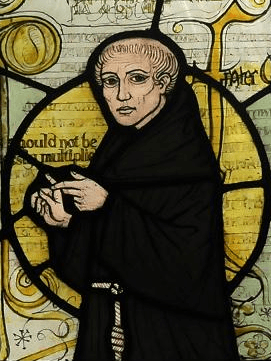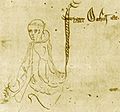William of Ockham facts for kids
Quick facts for kids
William of Ockham
OFM
|
|
|---|---|

William of Ockham depicted on a stained glass window at a church
|
|
| Born | 1287 Ockham, Surrey, England
|
| Died | 9 April 1347 (aged 59–60) |
| Education | Greyfriars, London |
| Alma mater | University of Oxford |
|
Notable work
|
Summa Logicae |
| Era |
|
| Region | Western philosophy |
| School |
|
|
Main interests
|
|
|
Notable ideas
|
|
|
Influences
|
|
William of Ockham (around 1287 – 10 April 1347) was an English Franciscan friar and a very important philosopher and theologian. He was born in Ockham, Surrey, a small village in England. He is known as one of the most important thinkers of the Middle Ages. He was involved in many big arguments about ideas and politics in the 1300s.
William of Ockham is most famous for something called Occam's razor. This is a rule that helps people think more clearly. He also wrote important books about logic, physics, and theology. The Church of England remembers him on April 10th.
Contents
William of Ockham's Life Story
William of Ockham was born in Ockham, Surrey in 1287. He went to school in London at a place called Greyfriars. People believe he then studied theology at the University of Oxford from 1309 to 1321. Even though he finished all the work needed for a master's degree, he never became a full professor. Because of this, he was called Venerabilis Inceptor, which means "Venerable Beginner."
Why William Faced Trouble
During the Middle Ages, a book called Sentences by Peter Lombard was a key text for theology students. Many scholars wrote comments on it, including William of Ockham. However, William's comments were not liked by his colleagues or by the Church leaders. In 1324, a group of bishops said his ideas were wrong. He was told to go to Avignon, France, to explain himself to the Pope's court.
Some historians think he was first a philosophy professor in Avignon. But his problems started around 1327. It's thought that John Lutterell, a leader at Oxford, made these accusations.
The Fight Over Poverty
William of Ockham got involved in a big argument about "Apostolic poverty." This was a belief held by the Franciscans. They thought that Jesus and his followers, the apostles, did not own any property. The rules of the Franciscan order said its members should also live without owning anything.
This idea caused a big disagreement with Pope John XXII. The Pope believed the Franciscans should own property.
Leaving Avignon and Exile
Because the Pope was against the Franciscan rule, William of Ockham and other Franciscan leaders left Avignon on May 26, 1328. They found safety with Louis IV of Bavaria, the Holy Roman Emperor. Louis IV was also having arguments with the Pope, so he became William's protector.
William studied the Pope's writings and agreed with the Franciscan leaders. He believed Pope John XXII was wrong for attacking the idea of Apostolic poverty. In return for protection, William wrote papers supporting Emperor Louis IV. He argued that the Emperor should have power over both the Church and the state in his empire. On June 6, 1328, William was officially kicked out of the Church for leaving Avignon without permission. However, his philosophical ideas were never officially called heresy.
William spent the rest of his life writing about political issues. He wrote about who should have more power: the Church or the government. He died on April 9, 1347, before the big plague started.
William's Ideas and Thinking
William of Ockham wanted to make scholasticism simpler. Scholasticism was a way of thinking and learning in the Middle Ages. He used many ideas from earlier thinkers, especially Duns Scotus.
Faith and Reason: What William Believed
William of Ockham believed that we can only understand religious truths through faith. He thought that God's ways are not something human logic can fully figure out. He saw God as the only truly necessary thing in existence. His main importance was as a theologian who was very interested in clear, logical ways of thinking.
What is Nominalism?
William of Ockham was a leader in an idea called nominalism. Some people even call him the father of modern epistemology, which is the study of knowledge. He strongly argued that only individual things exist. For example, only a specific tree exists, not a general idea of "treeness" that exists separately. He believed that general ideas, or "universals," are just concepts our minds create from looking at many individual things. They don't exist outside our minds.
He is sometimes called a "terminist" because he thought these general ideas were like "terms" or words that stand for real things in our minds.
Occam's Razor: Simpler is Better
One of William's most important ideas is called Occam's razor. This principle helps us reason more effectively. It says that if you can explain something without making too many assumptions, then you should choose the simplest explanation. In other words, don't make things more complicated than they need to be.
William believed that the only truly necessary thing is God. Everything else depends on God. He argued that human reason alone cannot prove things like the soul living forever or that God exists, is one, or is infinite. He thought these truths come only from religious revelation.
Understanding Nature
William wrote a lot about natural philosophy, which was the study of nature. This included a long commentary on Aristotle's book Physics. Following his idea of simplicity, he believed we don't need to imagine too many different kinds of things existing in the world. For example, he thought mathematical ideas are not "real" things themselves. Instead, mathematics helps us understand other real things like objects or their qualities. This way of thinking was a step towards modern science.
How We Gain Knowledge
In his ideas about knowledge, William rejected an old theory that said our minds create "species" or copies of objects to understand them. He thought this was unnecessary. Instead, he favored a theory where our minds "abstract" ideas directly from individual things. He also talked about two types of understanding:
- Intuitive understanding: This depends on whether an object is actually there or not.
- Abstractive understanding: This "abstracts" or takes the idea of the object without needing it to be present.
Ideas on Government and Power
William of Ockham is also seen as an important person in the development of Western ideas about government. He believed in a government with limited power. He was one of the first thinkers in the Middle Ages to suggest that the Church and the government should be separate. He also had important ideas about property rights.
William argued that the Pope and church leaders should not have earthly power or own property. He believed that this power belongs only to earthly rulers. He even said that earthly rulers could accuse the Pope of crimes if needed.
He thought that after the Fall (when Adam and Eve disobeyed God), God gave all people, even non-Christians, two powers:
- The right to own private property.
- The right to choose their leaders.
He believed these leaders should serve the people, not just special groups. This idea was similar to the social contract theory that came much later with thinkers like Thomas Hobbes.
William said that Franciscans avoided owning things by simply using them, like food and clothes, without having any rights to them. The ownership still belonged to the person who gave the item or to the Pope. But his opponents, like Pope John XXII, argued that you can't use something justly if you don't have any right to it. These arguments about the Franciscans' poverty helped William and others develop some basic ideas about economics and ownership.
Logic and Thinking
In the field of logic, William of Ockham wrote down rules that were later called De Morgan's laws. He also thought about ternary logic, which is a system with three possible truth values (instead of just true or false). This idea was explored again much later in mathematics. His work on how words get their meaning is still studied by logicians today. He was likely the first logician to handle "empty terms" (like "unicorns" when there are none) in Aristotle's logic system.
William's Religious Ideas
Church Authority
William of Ockham did not believe that the Pope could never be wrong (papal infallibility). He often disagreed with the Pope. However, even with these disagreements, he did not leave the Roman Catholic Church. Ockham also thought that Church councils could make mistakes. He believed that any person could be wrong about matters of faith, and since councils are made of many people, they could also be wrong. This idea was similar to some of Martin Luther's later views.
Church and Government
Ockham taught that the Church and the government should be separate. He believed the Pope and the Emperor should have their own distinct powers.
Voluntary Poverty
Ockham strongly supported the idea of living a simple life and choosing to be poor.
The Soul
Ockham suggested that the souls of Christians might not immediately see God after death. Instead, he thought they would only experience this vision when they are reunited with their bodies at the final judgment.
William of Ockham in Stories
William of Ockham's ideas helped inspire the character of William of Baskerville in Umberto Eco's famous novel The Name of the Rose. He is also the main character in La abadía del crimen (The Abbey of Crime), a video game based on that novel.
Images for kids
See also
 In Spanish: Guillermo de Ockham para niños
In Spanish: Guillermo de Ockham para niños
- Gabriel Biel
- Philotheus Boehner
- History of science#Middle Ages
- List of Catholic clergy scientists
- List of scholastic philosophers
- Ernest Addison Moody
- occam (programming language)
- Ockham algebra
- Oxford Franciscan school
- Rule according to higher law
- Terminism
 | Janet Taylor Pickett |
 | Synthia Saint James |
 | Howardena Pindell |
 | Faith Ringgold |



